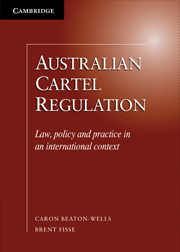Book contents
- Frontmatter
- Contents
- About the authors
- Preface
- Acknowledgements
- Abbreviations
- 1 Introduction
- 2 The legal framework governing cartel conduct
- 3 Collusion (contracts, arrangements, understandings)
- 4 Cartel and other provisions
- 5 Fault elements of the cartel offences
- 6 Individual liability for cartel conduct
- 7 Corporate liability
- 8 Exceptions
- 9 Enforcement policy
- 10 Immunity and cooperation policies
- 11 Sanctions
- 12 Compliance and liability control
- 13 Conclusion
- Appendix Trade Practices Act 1974 (Cth) Pt IV Div 1; Pt IV Div 2 s 45
- Index
11 - Sanctions
Published online by Cambridge University Press: 05 December 2011
- Frontmatter
- Contents
- About the authors
- Preface
- Acknowledgements
- Abbreviations
- 1 Introduction
- 2 The legal framework governing cartel conduct
- 3 Collusion (contracts, arrangements, understandings)
- 4 Cartel and other provisions
- 5 Fault elements of the cartel offences
- 6 Individual liability for cartel conduct
- 7 Corporate liability
- 8 Exceptions
- 9 Enforcement policy
- 10 Immunity and cooperation policies
- 11 Sanctions
- 12 Compliance and liability control
- 13 Conclusion
- Appendix Trade Practices Act 1974 (Cth) Pt IV Div 1; Pt IV Div 2 s 45
- Index
Summary
Introduction – inadequacies and uncertainties in sanctions design and application
Sanctions are central to the discourse surrounding anti-cartel law enforcement. Much of the law and policy in this field has been formulated with a view to introducing particular types of sanctions. The types of sanctions adopted in the legal framework also have implications for the types of agencies engaged in enforcement and for the nature and extent of investigatory powers and resources available to them.
Since the late 1990s, led by the US authorities and sponsored by international organisations such as the OECD and the ICN, there has been a movement by governments and enforcement agencies towards making sanctions for cartel conduct tougher. Instigated in the name of greater deterrence, the movement has generated numerous official studies and reports and, in many instances, legislative action or policy refinement. As a result, at least in the major jurisdictions such as the US and the EU, there have been sustained dramatic increases in the number and severity of sanctions over the last decade. This official activity has prompted significant new academic interest in the sanctioning of cartel conduct which in turn builds on a body of literature from economics, law and criminology concerning theories and methods of punishment generally.
While the sanctions movement raises many issues, there are two broad themes. The first relates to the balance between corporate and individual sanctions. Traditionally, at least outside the US, sanctions against corporations have been the primary, if not sole, deterrent against cartel violations. For the most part, these sanctions have been monetary in nature. However, recognising the limitations of fines, increasing attention has been given to the wider possible use of non-monetary measures, directed largely at corporations with a view to fostering stronger internal compliance controls.
- Type
- Chapter
- Information
- Australian Cartel RegulationLaw, Policy and Practice in an International Context, pp. 421 - 532Publisher: Cambridge University PressPrint publication year: 2011



